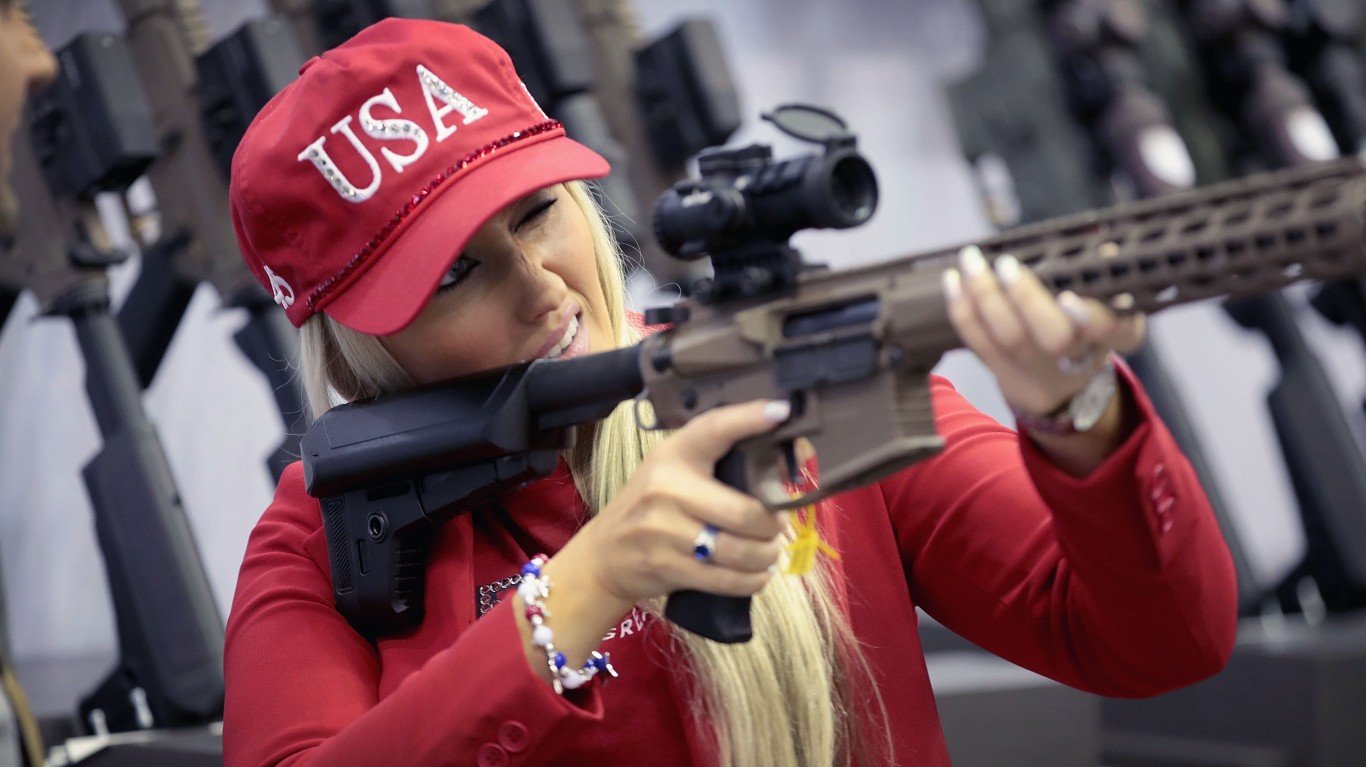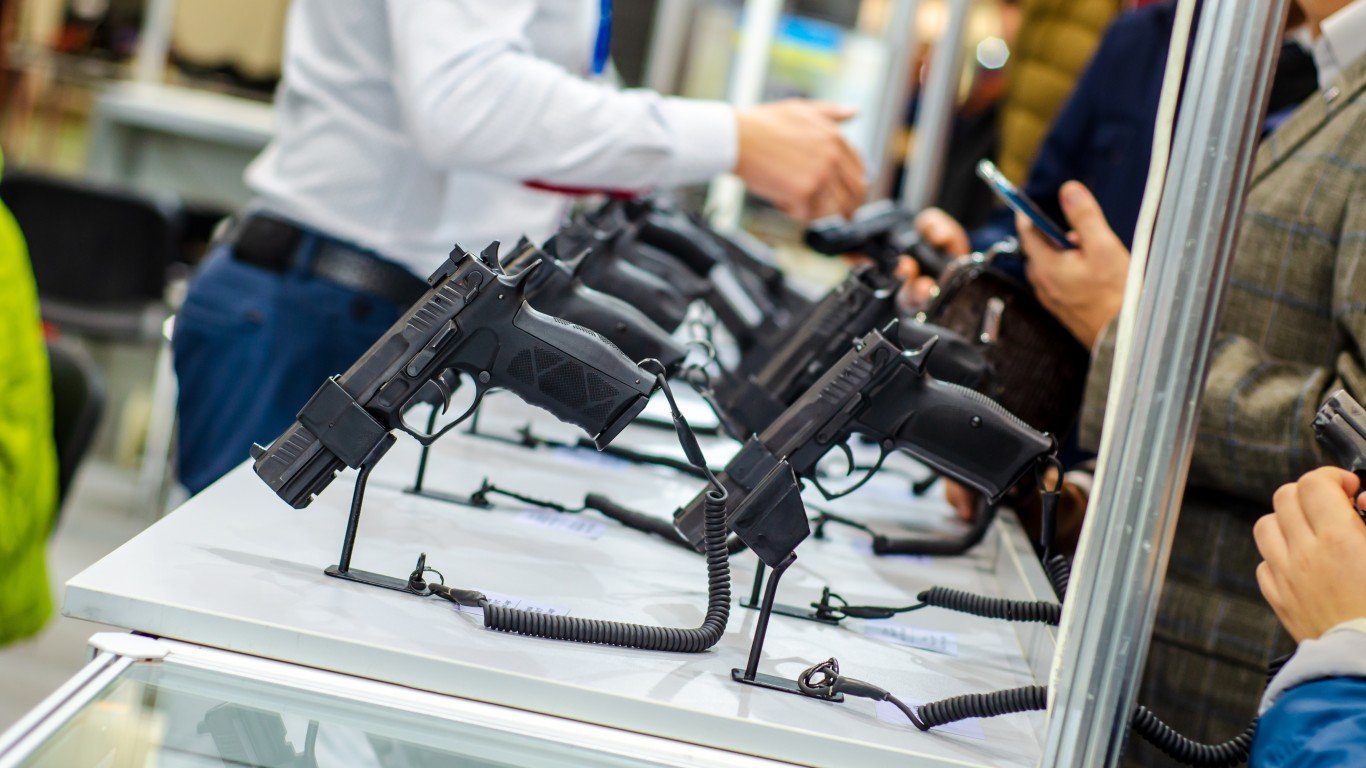

Gun control has been among the most divisive issues in American politics for decades. While the Second Amendment to the U.S. Constitution guarantees the right to keep and bear arms, exactly how far those rights extend – and to whom – has long been the subject of legal interpretation. And perhaps nowhere is the full spectrum of politically-tenable viewpoints on gun policy more clearly demonstrated than in laws enacted at the state level.
Under federal law, machine gun sales are restricted, and certain convicted criminals, non-citizens, illicit drug users, and those with a history of mental illness are prohibited from gun ownership. Beyond that, gun control regulations are largely left to state governments. And across the 50 states, gun policy varies widely.
In some of the most restrictive states, like Illinois, prospective gun buyers must have a valid firearm license and are subject to a mandatory three-day waiting period. Additionally, assault-style weapons sales are restricted and high-capacity magazines are banned. (Here is a look at the nine states that have banned assault-style weapons.)
Meanwhile, none of these regulations exists in nearby Kansas, where residents are free to carry a firearm, concealed or otherwise, in public places. In Kansas, as in many other states, residents can even purchase a firearm from an unlicensed dealer without completing a background check.
Using Gifford Law Center’s Annual Gun Law Scorecard, 24/7 Wall St. reviewed firearm regulations in each state. States are listed in alphabetical order.
Geographically, states with the tightest gun control laws tend to be in the Northeast and along the West Coast. The states that champion gun rights, meanwhile, are spread across the country, but are especially concentrated in the South, Midwest, and the non-coastal West.
Stricter gun control policies are typically put in place to reduce the likelihood of gun violence, and more often than not, the states that enact stricter regulations have lower levels of deadly incidents involving firearms. According to 2021 firearm mortality data from the Centers for Disease Control and Prevention, seven of the 10 states with the lowest gun death rates are also among the 10 states with the strictest gun control laws. Meanwhile, nine of the 10 states with the highest gun death rates have some of the loosest gun control laws in the country. (Here is a look at the states where gun-related crimes are surging.)
It is important to note that the laws noted in this story are not exhaustive and are only broad guidelines. Legal nuances can vary at the state and local levels.
Click here to see gun laws in each of the 50 states.

Alabama
> Gun law strength grade: F
> Notable gun controls: Mental health record reporting, required handgun dealer licensing
> Notable gun rights: No universal background checks, no assault-style weapon restrictions, no waiting periods, no open-carry regulations, no high-capacity magazine ban
> Gun deaths in 2021: 26.4 per 100,000 people – 4th highest of 50 states (1,315 total)
[in-text-ad]

Alaska
> Gun law strength grade: F
> Notable gun controls: Mental health record reporting
> Notable gun rights: No universal background checks, no assault-style weapon restrictions, no waiting periods, no open-carry regulations, no high-capacity magazine ban, concealed carry without a permit
> Gun deaths in 2021: 25.2 per 100,000 people – 6th highest of 50 states (182 total)

Arizona
> Gun law strength grade: F
> Notable gun controls: Firearms prohibited at polling places, mental health record reporting
> Notable gun rights: No universal background checks, no assault-style weapon restrictions, no waiting periods, no open-carry regulations, no high-capacity magazine ban, concealed carry without a permit
> Gun deaths in 2021: 18.3 per 100,000 people – 17th highest of 50 states (1,365 total)

Arkansas
> Gun law strength grade: F
> Notable gun controls: Partial mental health record reporting
> Notable gun rights: No universal background checks, no assault-style weapon restrictions, no waiting periods, no open-carry regulations, no high-capacity magazine ban
> Gun deaths in 2021: 23.3 per 100,000 people – 8th highest of 50 states (698 total)
[in-text-ad-2]

California
> Gun law strength grade: A
> Notable gun controls: Universal background checks, enhanced firearm eligibility standards, restrictions on assault-style weapons and high-capacity magazines, waiting periods, public carry restrictions, ammunition regulation
> Notable gun rights: N/A
> Gun deaths in 2021: 9.0 per 100,000 people – 8th lowest of 50 states (3,576 total)

Colorado
> Gun law strength grade: B
> Notable gun controls: Universal background checks, high-capacity magazine restrictions, extended background check period
> Notable gun rights: No gun-ownership license requirements, no restrictions on assault-style weapons, no waiting period, open-carry permitted
> Gun deaths in 2021: 17.8 per 100,000 people – 18th highest of 50 states (1,064 total)
[in-text-ad]

Connecticut
> Gun law strength grade: A-
> Notable gun controls: Universal background checks, restrictions on assault-style weapons and high-capacity magazines, open and concealed carry restrictions, gun owner licensing
> Notable gun rights: No safe-storage requirements, no restrictions on bulk firearm purchases
> Gun deaths in 2021: 6.7 per 100,000 people – 6th lowest of 50 states (248 total)

Delaware
> Gun law strength grade: B
> Notable gun controls: Universal background checks, restrictions on concealed-carry, restrictions on assault-style weapons and high-capacity magazines
> Notable gun rights: No gun-ownership license requirements, no waiting period, open-carry permitted
> Gun deaths in 2021: 16.6 per 100,000 people – 23rd highest of 50 states (158 total)

Florida
> Gun law strength grade: C-
> Notable gun controls: Waiting periods, enhanced background check procedures, regulations on open-carry
> Notable gun rights: No universal background checks, no assault-style weapon restrictions, no high-capacity magazine ban, no gun owner licensing
> Gun deaths in 2021: 14.1 per 100,000 people – 17th lowest of 50 states (3,142 total)
[in-text-ad-2]

Georgia
> Gun law strength grade: F
> Notable gun controls: Some open-carry regulations, child access prevention laws, regulations on handgun dealers
> Notable gun rights: No universal background checks, no assault-style weapon restrictions, no waiting periods, no high-capacity magazine ban, concealed carry without a permit
> Gun deaths in 2021: 20.3 per 100,000 people – 14th highest of 50 states (2,200 total)

Hawaii
> Gun law strength grade: A-
> Notable gun controls: Universal background checks, restrictions on some assault-style weapons and high-capacity magazines, open and concealed carry restrictions, gun owner licensing, waiting periods
> Notable gun rights: No safe-storage requirements, no restrictions on bulk firearm purchases or ammunition sales
> Gun deaths in 2021: 4.8 per 100,000 people – 2nd lowest of 50 states (71 total)
[in-text-ad]

Idaho
> Gun law strength grade: F
> Notable gun controls: Mental health record reporting
> Notable gun rights: No universal background checks, no assault-style weapon restrictions, no waiting periods, no high-capacity magazine ban, concealed carry without a permit, no open-carry regulations
> Gun deaths in 2021: 16.3 per 100,000 people – 25th highest of 50 states (309 total)

Illinois
> Gun law strength grade: A-
> Notable gun controls: Universal background checks, restrictions on assault-style weapons and high-capacity magazines, open-carry restrictions, gun owner licensing, waiting periods
> Notable gun rights: No restrictions on bulk firearm purchases
> Gun deaths in 2021: 16.1 per 100,000 people – 25th lowest of 50 states (1,995 total)

Indiana
> Gun law strength grade: F
> Notable gun controls: Some open-carry regulations, child access prevention laws, regulations on handgun dealers, extreme risk protection orders
> Notable gun rights: No universal background checks, no assault-style weapon restrictions, no waiting periods, no high-capacity magazine ban, concealed carry without a permit
> Gun deaths in 2021: 18.4 per 100,000 people – 16th highest of 50 states (1,251 total)
[in-text-ad-2]

Iowa
> Gun law strength grade: F
> Notable gun controls: Some domestic violence gun laws, child access prevention laws
> Notable gun rights: No universal background checks, no assault-style weapon restrictions, no high-capacity magazine ban, concealed carry without a permit
> Gun deaths in 2021: 11.2 per 100,000 people – 11th lowest of 50 states (364 total)

Kansas
> Gun law strength grade: F
> Notable gun controls: Mental health record reporting
> Notable gun rights: No universal background checks, no assault-style weapon restrictions, no waiting periods, no high-capacity magazine ban, concealed carry without a permit, no open-carry regulations
> Gun deaths in 2021: 17.3 per 100,000 people – 21st highest of 50 states (503 total)
[in-text-ad]

Kentucky
> Gun law strength grade: F
> Notable gun controls: Some child access prevention laws
> Notable gun rights: No universal background checks, no assault-style weapon restrictions, no waiting periods, no high-capacity magazine ban, concealed carry without a permit, no open-carry regulations
> Gun deaths in 2021: 21.1 per 100,000 people – 13th highest of 50 states (947 total)

Louisiana
> Gun law strength grade: F
> Notable gun controls: Some domestic violence gun laws
> Notable gun rights: No universal background checks, no assault-style weapon restrictions, no waiting periods, no high-capacity magazine ban, no open-carry regulations
> Gun deaths in 2021: 29.1 per 100,000 people – 2nd highest of 50 states (1,314 total)

Maine
> Gun law strength grade: F
> Notable gun controls: Mental health record reporting, child access prevention laws
> Notable gun rights: No universal background checks, no assault-style weapon restrictions, no waiting periods, no high-capacity magazine ban, concealed carry without a permit, no open-carry regulations
> Gun deaths in 2021: 12.6 per 100,000 people – 14th lowest of 50 states (178 total)
[in-text-ad-2]

Maryland
> Gun law strength grade: A-
> Notable gun controls: Universal background checks, restrictions on some assault-style weapons and high-capacity magazines, open and concealed carry restrictions, licensing laws
> Notable gun rights: N/A
> Gun deaths in 2021: 15.2 per 100,000 people – 22nd lowest of 50 states (915 total)

Massachusetts
> Gun law strength grade: A-
> Notable gun controls: Universal background checks, restrictions on assault-style weapons and high-capacity magazines, open and concealed carry restrictions, gun owner licensing
> Notable gun rights: N/A
> Gun deaths in 2021: 3.4 per 100,000 people – the lowest of 50 states (247 total)
[in-text-ad]

Michigan
> Gun law strength grade: C+
> Notable gun controls: State-level handgun background check database, some licensing requirements
> Notable gun rights: No universal background checks for long guns, no assault-style weapon restrictions, no high-capacity magazine restrictions, no open-carry regulations
> Gun deaths in 2021: 15.4 per 100,000 people – 23rd lowest of 50 states (1,544 total)

Minnesota
> Gun law strength grade: C+
> Notable gun controls: Some assault weapon restrictions, some waiting period laws, ammunition sale regulations, some open-carry regulations
> Notable gun rights: No universal background checks, no high-capacity magazine bans, no bulk firearm purchase restrictions
> Gun deaths in 2021: 10.0 per 100,000 people – 9th lowest of 50 states (573 total)

Mississippi
> Gun law strength grade: F
> Notable gun controls: Partial mental health record reporting, some child access prevention laws
> Notable gun rights: No universal background checks, no assault-style weapon restrictions, no waiting periods, no high-capacity magazine ban, concealed carry without a permit, no open-carry regulations
> Gun deaths in 2021: 33.9 per 100,000 people – the highest of 50 states (962 total)
[in-text-ad-2]

Missouri
> Gun law strength grade: F
> Notable gun controls: Some open-carry regulations, some child access prevention laws
> Notable gun rights: No universal background checks, no assault-style weapon restrictions, no waiting periods, no high-capacity magazine ban, concealed carry without a permit
> Gun deaths in 2021: 23.2 per 100,000 people – 9th highest of 50 states (1,414 total)

Montana
> Gun law strength grade: F
> Notable gun controls: Some domestic violence gun laws
> Notable gun rights: No universal background checks, no assault-style weapon restrictions, no waiting periods, no high-capacity magazine ban, no open-carry regulations
> Gun deaths in 2021: 25.1 per 100,000 people – 7th highest of 50 states (280 total)
[in-text-ad]

Nebraska
> Gun law strength grade: C
> Notable gun controls: State-level handgun background check database, some licensing requirements
> Notable gun rights: No universal background checks for long guns, no assault-style weapon restrictions, no high-capacity magazine restrictions, no open-carry regulations
> Gun deaths in 2021: 10.3 per 100,000 people – 10th lowest of 50 states (200 total)

Nevada
> Gun law strength grade: C+
> Notable gun controls: Universal background checks, state-level background check database
> Notable gun rights: no assault-style weapon restrictions, no high-capacity magazine ban, no waiting period, no open-carry regulations
> Gun deaths in 2021: 19.8 per 100,000 people – 15th highest of 50 states (633 total)

New Hampshire
> Gun law strength grade: F
> Notable gun controls: Handgun background checks, child access prevention laws, domestic violence gun laws
> Notable gun rights: No universal background checks, no assault-style weapon restrictions, no waiting periods, no high-capacity magazine ban, concealed carry without a permit, no open-carry regulations
> Gun deaths in 2021: 8.3 per 100,000 people – 7th lowest of 50 states (123 total)
[in-text-ad-2]

New Jersey
> Gun law strength grade: A
> Notable gun controls: Universal background checks, restrictions on assault-style weapons and high-capacity magazines, open and concealed carry restrictions, gun owner licensing
> Notable gun rights: N/A
> Gun deaths in 2021: 5.2 per 100,000 people – 3rd lowest of 50 states (475 total)

New Mexico
> Gun law strength grade: C+
> Notable gun controls: Universal background checks
> Notable gun rights: no assault-style weapon restrictions, no waiting periods, no open-carry regulations
> Gun deaths in 2021: 27.8 per 100,000 people – 3rd highest of 50 states (578 total)
[in-text-ad]

New York
> Gun law strength grade: A-
> Notable gun controls: Universal background checks, restrictions on some assault-style weapons and high-capacity magazines, open-carry restrictions
> Notable gun rights: No waiting period
> Gun deaths in 2021: 5.4 per 100,000 people – 4th lowest of 50 states (1,078 total)

North Carolina
> Gun law strength grade: C
> Notable gun controls: Some concealed-carry permitting with safety training
> Notable gun rights: No universal background checks, no assault-style weapon restrictions, no high-capacity magazine ban, no open-carry regulations
> Gun deaths in 2021: 17.3 per 100,000 people – 20th highest of 50 states (1,839 total)

North Dakota
> Gun law strength grade: F
> Notable gun controls: Some domestic violence gun laws
> Notable gun rights: No universal background checks, no assault-style weapon restrictions, no waiting periods, no high-capacity magazine ban, concealed carry without a permit, no open-carry regulations
> Gun deaths in 2021: 16.8 per 100,000 people – 22nd highest of 50 states (128 total)
[in-text-ad-2]

Ohio
> Gun law strength grade: F
> Notable gun controls: Lost or stolen firearm reporting
> Notable gun rights: No universal background checks, no assault-style weapon restrictions, no waiting periods, no high-capacity magazine ban, concealed carry without a permit, no open-carry regulations
> Gun deaths in 2021: 16.5 per 100,000 people – 24th highest of 50 states (1,911 total)

Oklahoma
> Gun law strength grade: F
> Notable gun controls: Some child access prevention laws
> Notable gun rights: No universal background checks, no assault-style weapon restrictions, no waiting periods, no high-capacity magazine ban
> Gun deaths in 2021: 21.2 per 100,000 people – 12th highest of 50 states (836 total)
[in-text-ad]

Oregon
> Gun law strength grade: B+
> Notable gun controls: Universal background checks, licensing laws, restrictions on high-capacity magazines
> Notable gun rights: no assault-style weapon restrictions, licensed concealed-carry
> Gun deaths in 2021: 14.9 per 100,000 people – 21st lowest of 50 states (670 total)

Pennsylvania
> Gun law strength grade: B-
> Notable gun controls: Universal background checks for handguns, enhanced background check procedures
> Notable gun rights: No universal background checks for long guns, no assault-style weapon restrictions, no high-capacity magazine restrictions, no open-carry regulations, no waiting periods
> Gun deaths in 2021: 14.8 per 100,000 people – 20th lowest of 50 states (1,905 total)

Rhode Island
> Gun law strength grade: B+
> Notable gun controls: Universal background checks, waiting period, open and concealed carry restrictions, high-capacity magazine restrictions
> Notable gun rights: no assault-style weapon restrictions, no restrictions on bulk firearm purchases
> Gun deaths in 2021: 5.6 per 100,000 people – 5th lowest of 50 states (64 total)
[in-text-ad-2]

South Carolina
> Gun law strength grade: F
> Notable gun controls: Partial mental health record reporting, some open-carry regulations
> Notable gun rights: No universal background checks, no assault-style weapon restrictions, no waiting periods, no high-capacity magazine ban
> Gun deaths in 2021: 22.4 per 100,000 people – 11th highest of 50 states (1,136 total)
South Dakota
> Gun law strength grade: F
> Notable gun controls: Mental health record reporting
> Notable gun rights: No universal background checks, no assault-style weapon restrictions, no waiting periods, no high-capacity magazine ban, concealed carry without a permit, no open-carry regulations
> Gun deaths in 2021: 14.3 per 100,000 people – 18th lowest of 50 states (128 total)
[in-text-ad]

Tennessee
> Gun law strength grade: F
> Notable gun controls: Some domestic violence gun laws, some open-carry regulations
> Notable gun rights: No universal background checks, no assault-style weapon restrictions, no waiting periods, no high-capacity magazine ban
> Gun deaths in 2021: 22.8 per 100,000 people – 10th highest of 50 states (1,569 total)

Texas
> Gun law strength grade: F
> Notable gun controls: Mental health record reporting, child access prevention laws
> Notable gun rights: No universal background checks, no assault-style weapon restrictions, no waiting periods, no high-capacity magazine ban, no open-carry regulations
> Gun deaths in 2021: 15.6 per 100,000 people – 24th lowest of 50 states (4,613 total)

Utah
> Gun law strength grade: F
> Notable gun controls: Domestic violence gun laws, some child access prevention laws, state background check database with extended check period
> Notable gun rights: No universal background checks, no assault-style weapon restrictions, no waiting periods, no high-capacity magazine ban, no open-carry regulations
> Gun deaths in 2021: 13.9 per 100,000 people – 16th lowest of 50 states (450 total)
[in-text-ad-2]

Vermont
> Gun law strength grade: C-
> Notable gun controls: Universal background checks, high-capacity magazine ban
> Notable gun rights: no assault-style weapon restrictions, no waiting periods, no open-carry regulations, no concealed carry permit
> Gun deaths in 2021: 11.9 per 100,000 people – 13th lowest of 50 states (83 total)

Virginia
> Gun law strength grade: B
> Notable gun controls: Universal background checks, some assault weapon restrictions
> Notable gun rights: No gun-ownership license requirements, no waiting period, open and concealed carry permitted in certain circumstances, high-capacity magazines permitted, no restrictions on bulk firearm purchases or ammunition sales
> Gun deaths in 2021: 14.3 per 100,000 people – 19th lowest of 50 states (1,248 total)
[in-text-ad]

Washington
> Gun law strength grade: B+
> Notable gun controls: Universal background checks, restrictions on some assault-style weapons and high-capacity magazines, extended background check period
> Notable gun rights: No gun-ownership license requirements, no restrictions on bulk firearm purchases, no safe-storage requirements, open-carry permitted
> Gun deaths in 2021: 11.2 per 100,000 people – 12th lowest of 50 states (896 total)

West Virginia
> Gun law strength grade: F
> Notable gun controls: Domestic violence gun laws
> Notable gun rights: No universal background checks, no assault-style weapon restrictions, no waiting periods, no high-capacity magazine ban, concealed carry without a permit, no open-carry regulations
> Gun deaths in 2021: 17.3 per 100,000 people – 19th highest of 50 states (319 total)

Wisconsin
> Gun law strength grade: D+
> Notable gun controls: State-level handgun background check database
> Notable gun rights: No universal background checks, no assault-style weapon restrictions, no high-capacity magazine ban, no waiting periods, no open-carry regulations
> Gun deaths in 2021: 13.5 per 100,000 people – 15th lowest of 50 states (793 total)
[in-text-ad-2]

Wyoming
> Gun law strength grade: F
> Notable gun controls: Concealed carry ban in bars
> Notable gun rights: No universal background checks, no assault-style weapon restrictions, no waiting periods, no high-capacity magazine ban, concealed carry without a permit, no open-carry regulations
> Gun deaths in 2021: 26.1 per 100,000 people – 5th highest of 50 states (155 total)
Essential Tips for Investing: Sponsored
A financial advisor can help you understand the advantages and disadvantages of investment properties. Finding a qualified financial advisor doesn’t have to be hard. SmartAsset’s free tool matches you with up to three financial advisors who serve your area, and you can interview your advisor matches at no cost to decide which one is right for you. If you’re ready to find an advisor who can help you achieve your financial goals, get started now.
Investing in real estate can diversify your portfolio. But expanding your horizons may add additional costs. If you’re an investor looking to minimize expenses, consider checking out online brokerages. They often offer low investment fees, helping you maximize your profit.
Thank you for reading! Have some feedback for us?
Contact the 24/7 Wall St. editorial team.
 24/7 Wall St.
24/7 Wall St.



